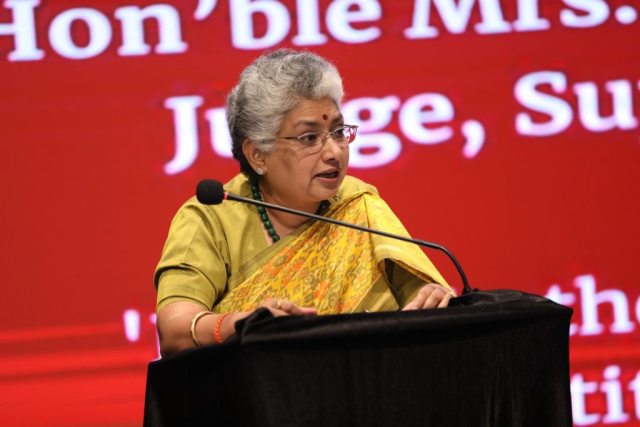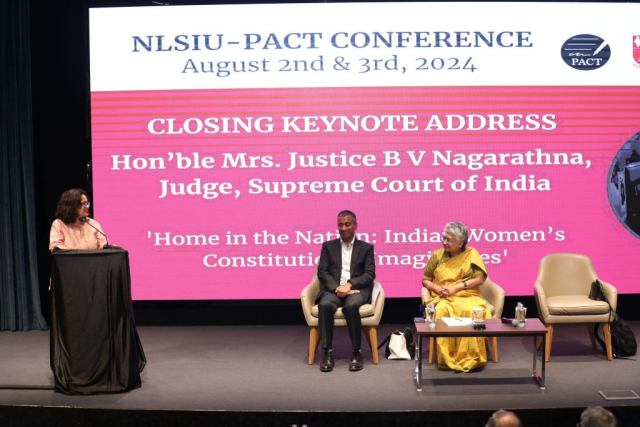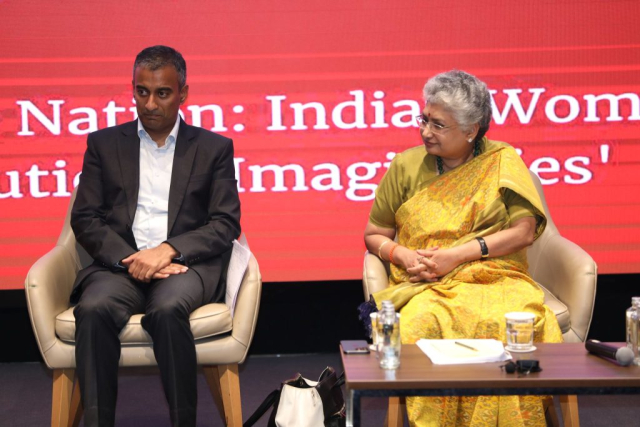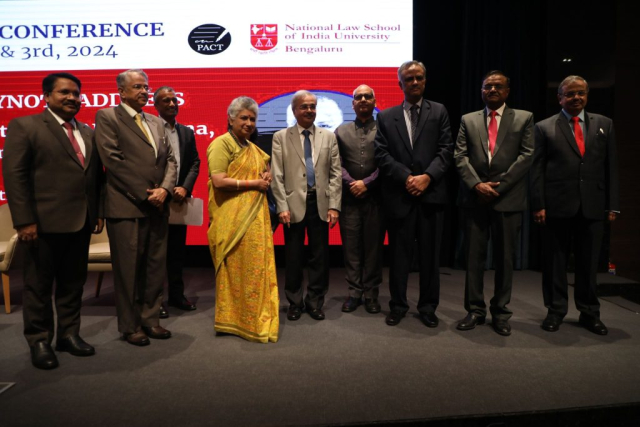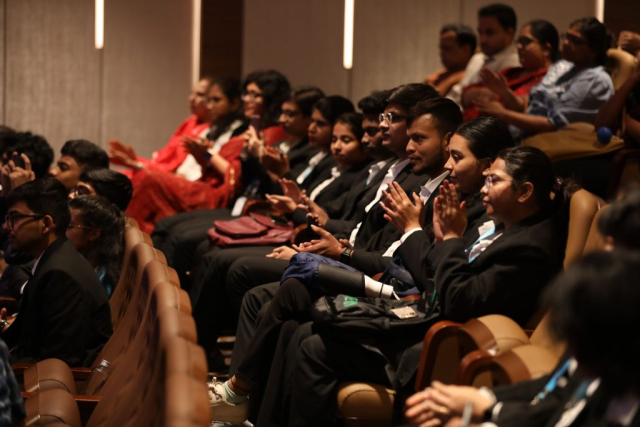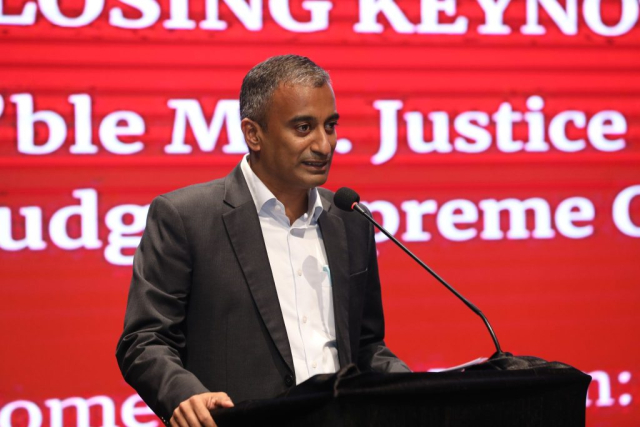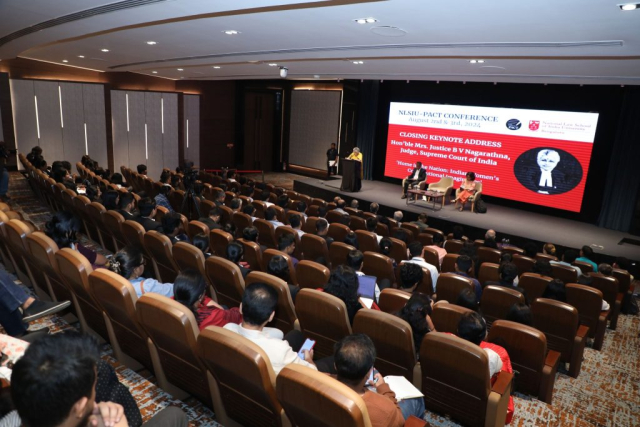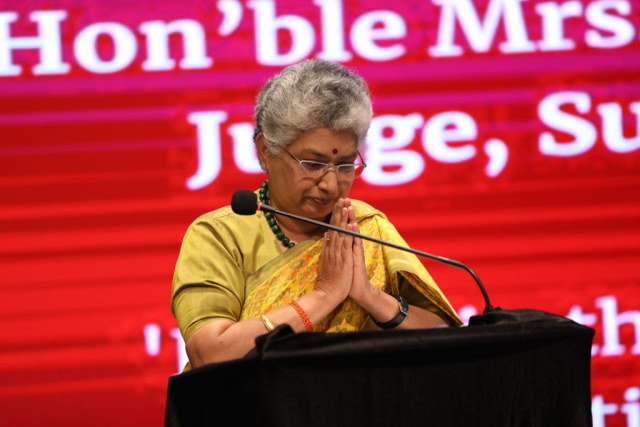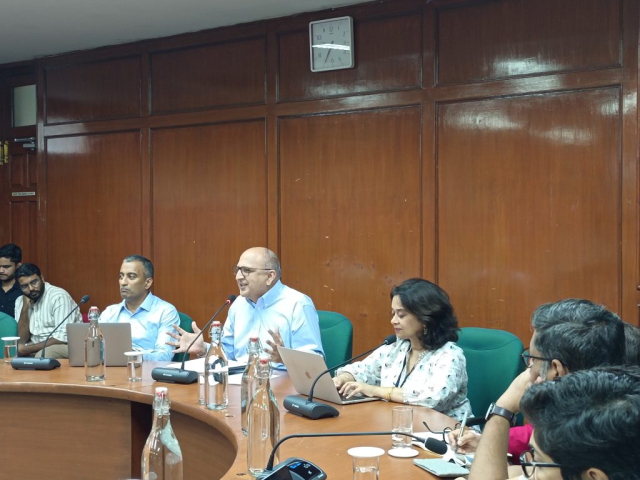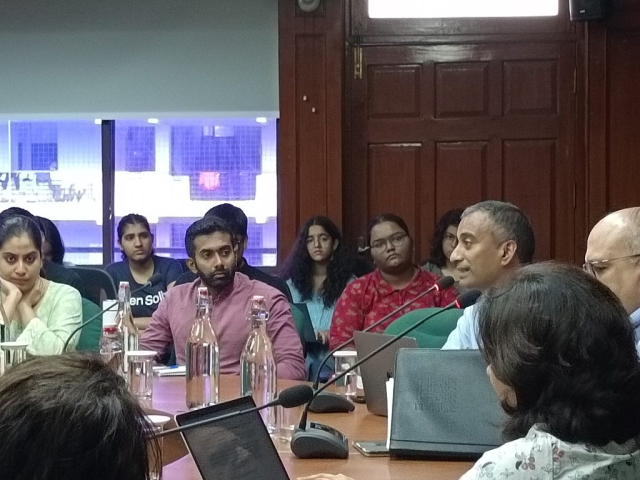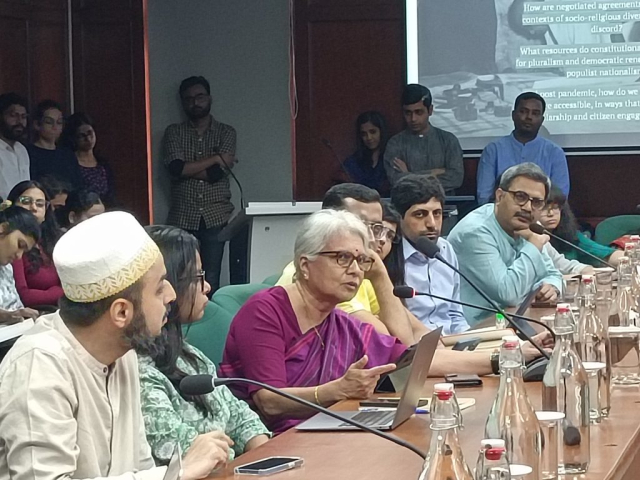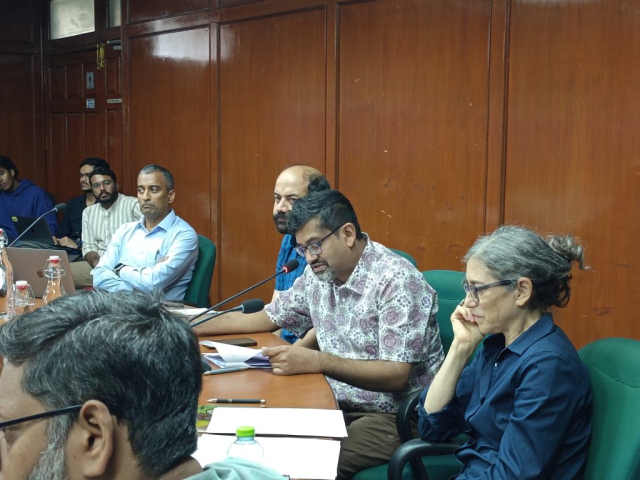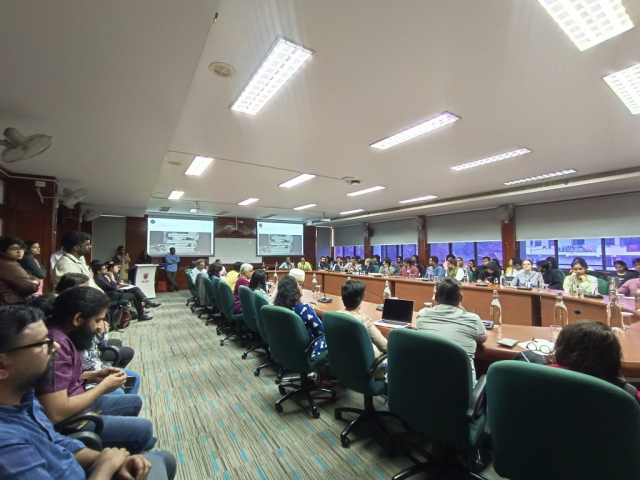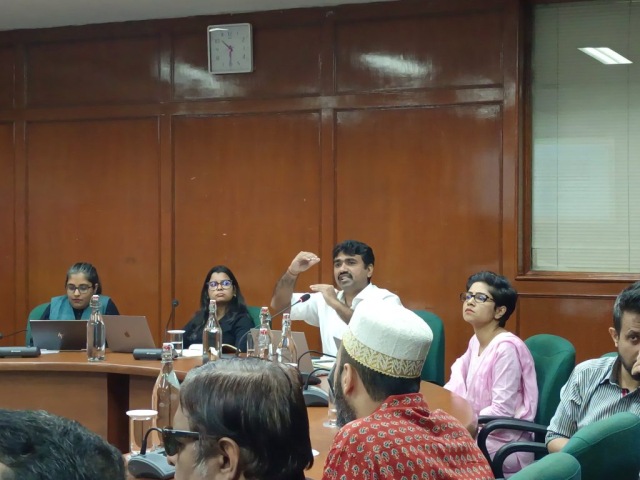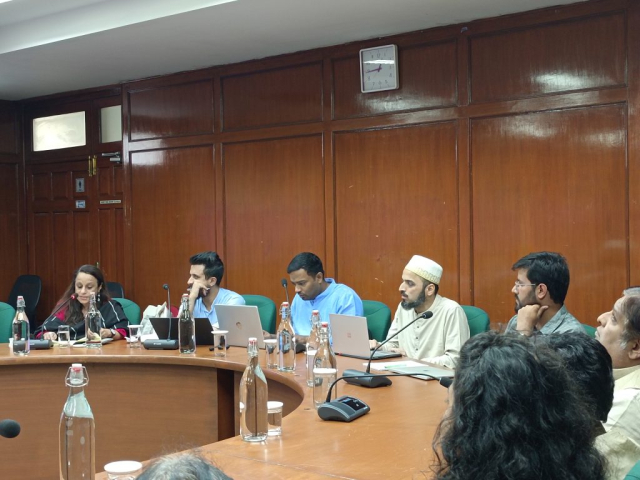Reflections from the NLSIU PACT Conference 2024 | Project on Pluralist Agreement and Constitutional Transformation
August 9, 2024
The National Law School of India University (NLSIU) organised a conference on August 2nd and 3rd, 2024, in Bengaluru as part of the Pluralist Agreement and Constitutional Transformation (PACT) Project. We hosted 21 panelists from across different locations in India and abroad, who presented their papers across five panels: i) Studying India’s Constitutional Founding: Methods and Archives; ii) Key Constitutional Choices: Democracy, Federalism and Social Transformation; iii) Forgotten Histories of Constitution Making; iv) Minority Rights in Indian Constitutionalism; and v) Deliberative Institutions in Indian Constitutionalism.
PACT is an international collaboration that aims to produce cutting-edge scholarship on India’s constitutional founding, establish a new digital archive on Indian constitution making, and learn from historical and contemporary public engagements with the Constitution. Led by SOAS University of London, PACT collaborators include the Universities of Oxford, York, the Centre for Law and Policy Research, Bengaluru and NLSIU. The conference explored Indian constitution-making as a process of reaching pluralist agreement between contending actors and constitutional transformation over time.
Keynote Address by Hon’ble Justice B V Nagarathna
Hon’ble Mrs. Justice B. V. Nagarathna, Judge, Supreme Court of India, delivered the closing keynote address on the topic ‘Home in the Nation: Indian Women’s Constitutional Imaginaries’.
Excerpt from the talk: “Indian constitutional democracy was not destined to greatness, it has earned it. In this arduous struggle to earn our stature as a mature democracy, our founding fathers and mothers have made countless sacrifices. Every successive generation has built this great country. As a part of this wide landscape of diversities, we should introspect as to whether founding ideals have been secured. Such an introspection would also provide a template for conversations about building a better tomorrow. We, as a nation have come a long way, but we have a longer way to go before truly meeting all the ideals of the founders, in the sense that they were envisaged. Fortunately, there is the Constitution which touches, moves and inspires our collective lives like a North Star. It is a permanent reminder that a more democratic, a more equal, a more just, and a more tolerant nation continues to remain an ideal, even in contemporary times…The valuable endeavours and efforts of our Founding Mothers must be carried forward by every succeeding generation of not only women but by all concerned. They did not limit themselves to only gender rights or women’s position in Indian society. The responsibility lies with us.”
Watch the full video of the talk here:
Keynote Address by Prof. Pratap Bhanu Mehta
Prof. Pratap Bhanu Mehta, Laurence S. Rockefeller Visiting Professor for Distinguished Teaching at Princeton University, delivered the opening keynote address.
Reflections
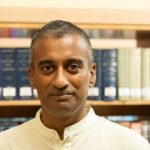 Prof. Sudhir Krishnaswamy,
Prof. Sudhir Krishnaswamy,
NLSIU Vice-Chancellor and, Co-Investigator, PACT Project
“The Pluralist Agreement and Constitutional Transformation (PACT) project is about two years old now and we have been working as part of a multi-university team based out of SOAS, University of Oxford, University of York and the National Law School, trying to develop a new understanding of the formation and process of the agreement that made the Indian constitution. The project has two parts – one part is to try and rethink and rework the archive of constitutional material that we take to be a useful corpus to understand the creation of the Indian constitution; and the second part focuses on developing new theoretical models to understand that transformation. Even in the outline of the sessions, some part is empirical and some part is more normative and theoretical. This conference is an opportunity for us to deepen our understanding of what we might have achieved or not in the last two years and invite, what I think, is an excellent group of scholars who are already engaged in this period of Indian constitutional history, to share their work with us, and take this conversation forward.”
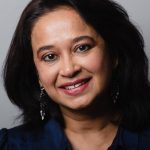 Professor Rochana Bajpai,
Professor Rochana Bajpai,
Professor of Politics, SOAS, and Principal Investigator, PACT Project
“It’s an honour and a privilege to be here at this fantastic institution which has produced much groundbreaking scholarship on the making of the Indian Constitution. There are many of us in this conference who’ve contributed a great deal to the understanding of constitutions and constitutional history.
PACT was envisaged as a research collaboration which would try to take forward the idea of constitutions as negotiated agreements between diverse groups of individuals. A key and often neglected aspect of the Indian Constitution is the fact that it was negotiated between very diverse groups of individuals who came to an agreement on a text, and in a divided world in which we live today, it’s extremely hard to come to agreement on any topic. The fact that such a diverse group of individuals at one of the most critical and violent and conflict-marked moment were able to reach an agreement is an achievement, however flawed the outcome of that agreement may be.
The PACT project seeks to understand how this process of agreement was arrived at between these diverse groups of individuals, and there are two sets of stories that we seek to foreground in the work we do which takes multiple forms – it’s archival, it’s digital, and it seeks to build new theoretical models. One story is that of forgotten amendments, of committees and amendments that were tabled or not tabled formally, whether they made their way into the Constitution or not. And with the help of the Quill project in Oxford, we are documenting and visualising that process in a new digital platform. The second story is that of forgotten histories of those who may have made representations, petitions, mobilizations of various kinds in relation to the Constitution; which then make their way either on to the plenary debates or to the final Constitution but which nevertheless engaged with Constitution making, as the pioneering work of historians has shown us in recent times.
These are the two neglected stories of constitution-making that we seek to foreground. We seek to learn from the example of how in the midst of pluralism and diversity, negotiations are conducted to reach outcomes which then last over time. The Indian constitution is a key example of a constitution in the Global South that is one of the longest lived, for all its flaws, and that continues in the present to elicit participation from people around the country, particularly the marginalised. We seek to learn from this process and we see it very much as a collaborative process.
Through the engagements and the research that the PACT project fosters, we seek to learn from what the Indian example can teach us about how negotiated agreements are arrived at in these contexts, and what we can learn from this process in a context which is marked by growing autocratisation, and growing concentration of power (political and economical) in smaller and smaller hands around the world.”
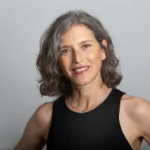 Prof. Ornit Shani,
Prof. Ornit Shani,
Senior Lecturer, Department of Asian Studies, University of Haifa
“It was a very rewarding experience! This is my first visit to NLSIU. I very much enjoyed meeting and interacting with faculty and students. The discussions at the conference were exceptionally engaging and fruitful. Thank you NLSIU for the wonderful hospitality.”
Panelists Prof. Ornit Shani and Dr. Rohit De presented a brief overview of their argument from their forthcoming book ‘Assembling India’s Constitution: A New History of Constitution Making’ (Cambridge University Press and Penguin Random House 2025). The book explores the making of the Indian Constitution as it emerged outside the Constituent Assembly, driven by diverse publics across the breadth and length of India’s territory and even beyond it.
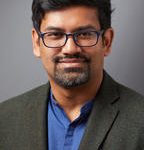 Dr. Rohit De,
Dr. Rohit De,
Associate Professor, Department of History, Yale University
“As an alum, it was a pleasure to come back to NLSIU and meet at the Training Centre (a building that had come up in my first year!) and find NLSIU to have grown as an intellectual hub and a space for ideas. The students and faculty, especially the expansion in the social sciences, makes NLSIU the place for not only invigorating and rigorous conversations, but also one where the participants understand the stakes of scholarship for the times we live in. I hope to return for more conversations.”
 Prof. Achyut Chetan,
Prof. Achyut Chetan,
Dean of Faculty of Arts and Social Sciences, St Xaviers University, Kolkata
“It was an absolutely lovely conference, particularly on the making of the constitution because we hardly remember that history. We think about the constitution as a political document, as a legal document, but rarely as a historical document. Therefore, to dedicate two full days with so many scholars looking at the history of the constitution from various perspectives is very important at this particular juncture of history. The quality of the discussion was very high, very provocative, and stimulating. I have learned a lot, and I believe I’ve also contributed to the discussion.
My paper was on the idea of introducing gender to constitutional history because most histories of the constitution are gender neutral. People talk about secularism, democracy, rights, reservations, and all kinds of issues which are related to the Constitution, but they’re blind to the gender aspect of all these things. And in most cases, I believe they end up making a mistake of universalizing the male gender.
My presentation was largely based on my own work, which I did on the role of women in the making of the constitution; not just women, I would say the role of feminists in the making of the constitution. I believe that feminists played a significant role in shaping the document, the 1950 constitution. There is not a single article in the constitution which does not have a feminist touch.
What I presented here was more focused on the methodology or the strategies of doing this history once you start becoming gender sensitive. So, what are the right places to look into if you want to find women’s voices or suppressed voices? What are the ways in which you can interpret some of the historical data? I do qualitative research. So I think interpretation of the data plays an important role. We have still not been able to retrieve all the necessary data regarding the making of the constitution. Once we do that, we also need to interpret them with a very sensitive, gendered lens.”
 Lauren Davis
Lauren Davis
Senior Documentary Editor, PACT Project, University Of Oxford
“I presented on the Quill project methodology and how we’re taking a methodology that we have, developed in Oxford to use specifically, in relation to American materials and applying it to the case of the Indian constitution. I talked a little bit about gathering sources and bringing together those sources and being able to visualize what certain proposals, amendments, pieces of text, debates, looked like within the context in which they were being debated. Also, the state of the constitution at any given point along the timeline of negotiation, how that helps us understand the contents of the constitution in new ways.
I think it’s always exciting to sit in a room and hear from different experts in the field, and listen to them present on topics that they’re so knowledgeable on. I personally don’t come from a history or law background. My area of specialization lies in editorial and archive management, so having that sort of input from the subject matter experts is really useful when it comes to thinking about the work we do at Quill.
The Indian constitution material is, just the volume of it is so much larger than anything we’ve ever worked with before, so I was really interested in showing people what we’re doing in-person. The American Constitution was debated in a much shorter period of time and resulted in a much shorter document, so a methodology like Quill is a lot easier to navigate. In this instance where the document itself is so much longer and the process is so much longer, I’m interested to know whether it is as effective as it could be i.e., the platform itself. It is just so much easier to get that feedback when you are able to have conversations.”
 Sarfaraz Hamid,
Sarfaraz Hamid,
Archival Researcher, PACT Project
“The paper I presented was on the National Archives and the Indian Constitutional history. I spoke about two aspects. The first one was about the National Archives as a primary and physical repository of housing the records of the Indian constituent assembly. The second aspect was my experiences of working as a part of the PACT project. I was introduced to this project by Dr. Udit Bhatia, in 2022, and then I came in contact with the others who are associated with PACT.
I must say that NLSIU, SOAS, and the University Of Oxford, have helped a lot in shaping the understanding of the Indian Constitution, alongside the constitutional work led by CLPR. I had an amazing colleague, Manas Raturi, working with me at the archives. Together, we managed to find more than 500 files from the National Archive, Public Records and the Rajendra Prasad Private Papers. About this conference, I must say that the mix of history and politics in this conference was very evident.”
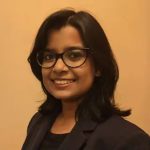 Adrija Ghosh,
Adrija Ghosh,
pursuing a DPhil in Law, at the University Of Oxford
“The aim of my presentation was to explore the persistent ambiguities surrounding the constitutional entrenchment of minority educational rights under Article 30 of the Indian Constitution. My interest is in uncovering how much of the contemporary debates surrounding the said provision emanates from the contestations that may have existed at the time of constitution-making, and to understand what the nature of these contestations were.
I was very grateful for the opportunity to participate and present my doctoral research at the conference. Importantly, it created an avenue for me to receive feedback from scholars who have produced the very best of scholarship in the area. Presenting my doctoral research at a relatively early stage, and having others engage with it, has indeed been a valuable experience. It has helped me clarify a lot of my own thoughts about the research that I’m undertaking.”
Gallery


